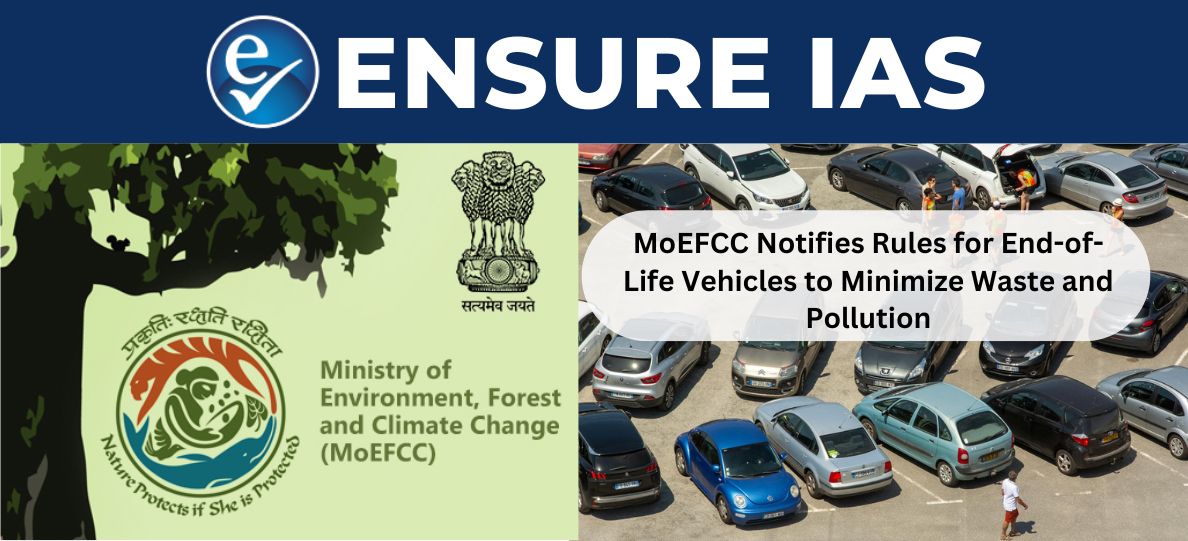- Courses
- GS Full Course 1 Year
- GS Full Course 2 Year
- GS Full Course 3 Year
- GS Full Course Till Selection
- Online Program
- GS Recorded Course
- NCERT (Recorded 500+ Hours)
- Polity Recorded Course
- Geography Recorded Course
- Economy Recorded Course
- AMAC Recorded Course
- Modern India, Post Independence & World History
- Environment Recoded Course
- Governance Recoded Course
- Science & Tech. Recoded Course
- International Relations and Internal Security Recorded Course
- Disaster Management Module Course
- Ethics Recoded Course
- Essay Recoded Course
- Current Affairs Recoded Course
- CSAT
- 5 LAYERED ARJUNA Mentorship
- Public Administration Optional
- ABOUT US
- OUR TOPPERS
- TEST SERIES
- FREE STUDY MATERIAL
- VIDEOS
- CONTACT US
MoEFCC Notifies Rules for End-of-Life Vehicles to Minimize Waste and Pollution
MoEFCC Notifies Rules for End-of-Life Vehicles to Minimize Waste and Pollution
31-01-2025

- On January 6, 2025, the Ministry of Environment, Forest and Climate Change (MoEFCC) notified the Environment Protection (End-of-Life Vehicles) Rules, 2025.
- The primary aim of these new regulations is to promote the recycling and reuse of vehicle components and materials.
- This will help to reduce the demand for new raw materials and minimize waste and pollution.
- These provisions will come into effect on April 1, 2025.
Key Points of the End-of-Life Vehicles Rules, 2025
Scope of the Rules:
- Entities Covered: The rules apply to various stakeholders in the vehicle lifecycle, including:
- Vehicle producers
- Registered owners of vehicles
- Bulk consumers of vehicles
- Registered Vehicle Scrapping Facilities (RVSF)
- Collection Centres
- Automated Testing Stations
- Entities involved in testing, handling, processing, and scrapping End-of-Life (ELV) vehicles.
- Entities Exempted: These rules will not apply to:
- Waste batteries (covered under Battery Waste Management Rules, 2022),
- Plastic packaging (covered under Plastic Waste Management Rules, 2016),
- Waste tyres and used oil (covered under Hazardous and Other Wastes Management Rules, 2016),
- E-waste (covered under E-Waste Management Rules, 2022).
- Types of Vehicles Covered: The rules apply to all types of vehicles, including electric vehicles (EVs), battery-operated vehicles, e-rickshaws, and e-carts. However, they do not apply to:
- Agricultural tractors,
- Agricultural trailers,
- Combine harvesters, and
- Power tillers.
Responsibilities of Stakeholders:
Producer's Obligations:
- Producers must fulfill their Extended Producer Responsibility (EPR) obligations for vehicles they introduce in the domestic market, including meeting the scrapping targets for End-of-Life vehicles.
- Producers are required to encourage the Deposit of End-of-Life Vehicles at registered scrapping facilities or collection centers.
- Producers must declare their Annual EPR obligations to the Central Board by April 30 each year.
- Sustainable Production Measures: Producers must take steps to ensure vehicles are produced in an environmentally sustainable manner in compliance with guidelines issued by the Central Board.
Registered Owner and Bulk Consumer's Responsibilities:
- Vehicle owners must ensure their vehicles undergo testing in compliance with the Motor Vehicles Act, 1988.
- Once a vehicle is considered End-of-Life, the registered owner or bulk consumer must deposit it at a designated collection center or RVSF within 180 days from the date it becomes an ELV. The vehicle cannot be kept beyond this period.
Collection Centre's Responsibilities:
- Collection centres are responsible for receiving and storing End-of-Life vehicles and transferring them to RVSFs.
- They must ensure that ELVs are handled and stored in an environmentally responsible manner.
- Collection centres must maintain records of all ELVs.
RVSF's Responsibilities:
A Registered Vehicle Scrapping Facility (RVSF) is a facility that dismantles and scraps vehicles in an environmentally friendly way.
- RVSFs must store different categories of waste separately.
- RVSFs are responsible for recycling materials and refurbishing components.
- They will carry out treatment, dismantling, and segregation of vehicle parts.
- Recycled materials must be sent to registered recyclers, and non-recyclable materials should be disposed of at Common Hazard Waste Treatment, Storage, and Disposal Facilities (TSDF).
- RVSFs will issue EPR certificates based on the quantity of steel processed from each End-of-Life vehicle. These certificates are valid for 5 years.
What are EPR Certificates and Registration Process?
- The Central Board will issue EPR certificates through an online portal to RVSFs.
- Producers can purchase EPR certificates to meet their current year’s obligations, along with any leftover obligations from previous years.
- These certificates are non-transferable and valid for 5 years.
- Producers must submit an application to the Central Board for registration.
- RVSFs and Bulk Consumers must apply to the State Board.
- The Central or State Board will issue a certificate of registration within 15 days of receiving the application.
Conclusion:
The new rules introduced by MoEFCC aim to tackle the growing issue of waste from End-of-Life vehicles in India. By promoting recycling, safe disposal, and sustainable practices, the rules intend to reduce the environmental impact of discarded vehicles. Producers, vehicle owners, and scrapping facilities will play crucial roles in ensuring the success of these measures, ultimately contributing to a cleaner, more sustainable environment.
|
Also Read |
|
UPSC Foundation Course |
UPSC Daily Current Affairs |
UPSC Monthly Mgazine |
CSAT Foundation Course |
Free MCQs for UPSC Prelims |
UPSC Test Series |
ENSURE IAS NOTES |
Our Booklist |
PLFS 2025: Monthly Jobs Data, Bigger Survey
PLFS 2025: Monthly Jobs Data, Bigger Survey


